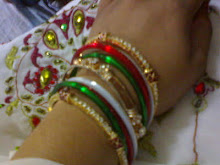
The actual wedding ceremony "Beeya" follows the Gaye Holud ceremonies. The wedding ceremony is arranged by the bride's family. On the day, the younger members of the bride's family barricade the entrance to the venue, and demands sort of admission charge from the groom in return for allowing him to enter. This is however done in fun, and is not an integral part of the wedding. There is a bargaining between groom and bride's family members on the amount of money of the admission. There is typically much good-natured pushing and shoving involved. Another custom is for the bride's younger siblings, friends and cousins to conceal the groom's shoes for money; to get them back the groom must usually pay off the children. Siblings, friends and cousins also plays many practical jokes on the groom.
For a Muslim wedding, the bride and groom are seated separately, and a Kazi (authorized person by the govt. to perform the wedding), accompanied by the parents and a Wakil (witness) from each side formally asks the bride for her consent to the union, and then the groom for his.
For a Hindu wedding, a priest makes couple chant mantras from the holy texts that formalises the following:
Kanyadaan (giving away of the bride by the father of the bride or a father figure, could be an uncle).
Saat Phera (The couple walks round the ceremonial fire seven times. See Saptapadi.)''
The actual formalizing of the wedding and the signing of paperworks is now done before the ceremony for convenience. Usually it is carried out on the morning of the wedding and the feast is at night.
At this time, for muslim weddings, the amount of the dowry or Mahr is verified, and if all is well, the formal papers are signed, and the couple are seated side by side on a dais. The brides oorna (headcovering) is draped over both, and a mirror placed in front. The groom is then supposed to say something romantic on what is notionally the first time he has laid eyes on his bride.
Everybody celebrates the union with a feast.
While seated on the dais, the bride's entourage will make attempts to steal the groom's shoes, which they will return for a ransom. Once the return of the shoes is negotiated.
In Bengali Hindu marriages on the day of the marriage (after wedding ceremony is over), close friends and relatives remain awake for the entire night. This is called the Basor Raat. Generally the day on which wedding is held Basor Raat starts after midnight if the wedding ceremony is over by evening. Most Hindu Bengali marriages happen in the evening.
The next day, preferably before noon, the couple make their way from the venue to the groom's home, where a bridal room has been prepared.
For a Muslim wedding, the bride and groom are seated separately, and a Kazi (authorized person by the govt. to perform the wedding), accompanied by the parents and a Wakil (witness) from each side formally asks the bride for her consent to the union, and then the groom for his.
For a Hindu wedding, a priest makes couple chant mantras from the holy texts that formalises the following:
Kanyadaan (giving away of the bride by the father of the bride or a father figure, could be an uncle).
Saat Phera (The couple walks round the ceremonial fire seven times. See Saptapadi.)''
The actual formalizing of the wedding and the signing of paperworks is now done before the ceremony for convenience. Usually it is carried out on the morning of the wedding and the feast is at night.
At this time, for muslim weddings, the amount of the dowry or Mahr is verified, and if all is well, the formal papers are signed, and the couple are seated side by side on a dais. The brides oorna (headcovering) is draped over both, and a mirror placed in front. The groom is then supposed to say something romantic on what is notionally the first time he has laid eyes on his bride.
Everybody celebrates the union with a feast.
While seated on the dais, the bride's entourage will make attempts to steal the groom's shoes, which they will return for a ransom. Once the return of the shoes is negotiated.
In Bengali Hindu marriages on the day of the marriage (after wedding ceremony is over), close friends and relatives remain awake for the entire night. This is called the Basor Raat. Generally the day on which wedding is held Basor Raat starts after midnight if the wedding ceremony is over by evening. Most Hindu Bengali marriages happen in the evening.
The next day, preferably before noon, the couple make their way from the venue to the groom's home, where a bridal room has been prepared.


No comments:
Post a Comment